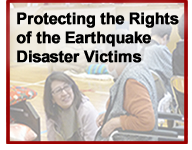16 May 2009
Asian Activist-a 2009
Women Changing the World
Challenge on Violence against Women in India
Human
Rights Now (HRN) supports and calls female activists as 'Activist-a',
who are engaged in activities to shed light on and overcome ongoing
grave violations of women's human rights in Asia.
HRN invited Ms. Nandini Rao, an Activist-a courageously fighting against domestic violence in
Date: 16th May 2009
Location: Aoyama Campus, Aoyama Gakuin University
Speakers:
Ms. Nandini Rao, a coordinator of JAGORI, Indian women's NGO
Ms. Yoko Hayashi, an attorney at law and a member of Committee on the Elimination of Discrimination against Women
Ms. Asako Osaki, an expert in gender and development policy
Coordinator:
Ms. Kazuko Ito, an attorney at law and a Secretary General of Human Rights Now
Ms. Nandini Rao:
is
a coordinator of JAGORI, an India NGO, which means awakening women.
Violence against women such as domestic violence has been a serious
problem in
Violence against women in
Anti-domestic violence law enacted in 2005
covers physical, mental and economic violence against women
comprehensively and guarantees women's rights to live in security and
dignity. Anti-domestic violence law stipulates that the government has
responsibility to ensure women's rights to live in security and this
law is a great tool which women's movement has obtained in
From an international point of view, the current situation in
Women's movement has
conducted their campaigns in various ways. JAGORI, which has marked the
25th anniversary of its establishment, has appealed for women's rights
in creative ways as well as in print campaign. Ms. Rao talked to
various people from Japanese organizations about an issue about how men
can get involved in women's movement. At the individual level, men's
participation in childcare is important, nevertheless, it is very hard
for Indian men who consider household chores and childcare as women's
work to take part in childcare. JAGORI is in the process of trial and
error to improve men's awareness as regards gender equality.
At
the village and local community levels, men's participation in women's
movement is desirable. Men should accept that in the local community,
sisters, mothers, wives and women in the neighbourhood fight against
violence against women. There has been a significant rise in the number
of men's organizations which deal with violence against women recently.
The greatest challenge JAGORI has faced is conventional prejudice
against women. The perception is deeply rooted in tradition and it is
not easy to change it.
In order to achieve equality in society, it
is inevitable to talk about gender equality. The change has to be
recognized as positive one for both men and women and JAGORI has been
getting the message out to the public. In future, JAGORI is going to
increase women's participation and to raise awareness of women's rights
in society.
Ms. Ito, Secretary General of Human Rights Now
and a facilitator of this discussion, said in the beginning 'While the
present situation in
Ms.
Yoko Hayashi, a member of Committee on the Elimination of
Discrimination against Women, outlined the ratification progress of the
Convention on the Elimination of all Forms of Discrimination against
Women, which marked the 30th anniversary, and the history of
international efforts for elimination of violence against women. She
also mentioned an issue of complex discrimination which women with
difficulties such as status of immigrant workers and refugees,
diseases, poverty and so forth. There are more barriers for those women
to restore their rights than ones for women with little difficulty. She
pointed out it is necessary to provide special treatment for those
women, depending on demands of each woman, rather than perfunctorily
equal treatment for all women.
She noted that under the Optional
Protocol to the Convention on the Elimination of all Forms of
Discrimination against Women, states have responsibility to prevent and
investigate violence against women, and prosecute and punish those
responsible, and make reparation for victims of the violence. In
She also raised an issue
about to what extent women can unite together just because they are
women, in spite of difference in context in which they live,
highlighted in the problem of complex discrimination.
Ms.
Osaki pointed out that the goal of development is that all men and
women in the world can live their lives in a humane manner and,
development and human rights are inseparable and thus development has
to be based on the principles of human rights. There are various
factors of violence against women such as power relationship between
men and women, social convention, economic imbalances, delays in
legislation, insufficient women's participation and so forth. Moreover,
she analysed violence against women in the perspective of development
cost, commenting that violence against women is not unacceptable from
the viewpoint of human rights violations but also should not be
overlooked in terms of social costs such as influence upon female
victims and care costs for those victims, socio-economic costs, and
costs as barrier to accomplish the MDGs.
In respect of Japanese
development assistance policies, she indicated that it is a duty of
Japan as a donor state to enhance awareness of those costs, to
mainstream gender perspective comprehensively in ODA policies, budget
allocation and implementation of the projects, and take more measures
against violence against women.
More issues were also widely
discussed such as problems of Japan's ODA policies, the enforcement
status of India's anti-domestic violence law, economic recession, and
influence of globalisation.
In closing, Ms. Rao gave a strong
message that "we need to keep on appealing, at any time and any place,
regardless of difference in women's positions in society, that the
attitude to diminish value of women is never acceptable. We women need
to unite together beyond all differences."
On
the 14th of May 2009, prior to the symposium, Ms. Rao participated as a
speaker in the 16th study session about violence against women and
international cooperation held by the female parliamentary group on
development headed by President Chieko Minamino, a member of the House
of Councillors and the Liberal Democratic Party, and Secretary General
Yoko Komiyama, a member of the House of Representatives and the
Democratic Party of Japan. She held talks with the Ministry of Foreign
Affairs and Japan International Cooperation Agency (JICA), and received
newspaper and magazine coverage.







